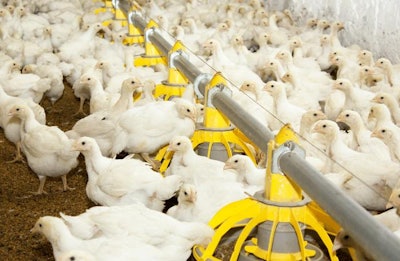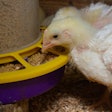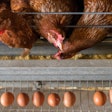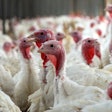
Novel strains of infectious bronchitis cause serious damage to broilers, breeders and layers. A vaccine program can help stop the disease.
As part of the 2021 International Production & Processing Expo (IPPE) Marketplace week, Dr. Jose Linares, manager of veterinarian services at Ceva Animal Health, spoke about the respiratory disease, its consequences and his company’s vaccine approach to preventing it. He spoke on Jan. 26, 2021.
Ceva Animal Health is a French animal health company marketing pharmaceuticals, vaccines and providing complimentary services and equipment for poultry as well as other animal species.
Infectious bronchitis in the US
Infectious bronchitis virus (IBV) is an acute, highly contagious viral disease that can infect chickens of every age. It is distributed worldwide and — depending on the virus strain — can cause damage to the respiratory, renal and/or reproductive systems. IBV is solely an avian disease prone to spontaneous mutation and recombination, which leads to an emergence of variants and new strains.
Linares said that currently these strains are the most relevant to North American producers: Georgia 08, Georgia 13, DMV1639 and PA/1220/98-like strains. The DMV1639 strain is currently the most damaging.
In 2014 and 2015, the Delmarva Peninsula experienced broiler mortality as high as 30% from kidney failure due to DMV1639. During that same period, flocks experienced what Linares called an Arkansas rolling reaction. This reaction is due to a poor vaccine take after vaccination in the hatchery. The vaccine then reemerges at random times during grow-out with clinical consequences, namely a rolling respiratory reaction.
Since 2015, DMV1639 infections have become more widespread, affecting poultry growing regions from Pennsylvania to Texas. Georgia 08 is focused in regions of Georgia, Alabama, Mississippi and North Carolina while Georgia 13 is affecting smaller regions of northeastern Georgia and coastal North Carolina.
DMV1639
Linares said the DMV1639 IBV is a virus unlike any other previously seen in the U.S. because of its clinical consequences for the birds, which include: flushing and huddling of the flock, and severe dehydration, resulting in mortality and severe kidney damage.
He highlighted two particularly virulent effects. First, the disease causes a silent form of airsacculitis — which does not display auditory symptoms as the disease typically does — that leads to caseous airsacculitis and airsac-based condemnations at the processing plant. Second, it can decrease egg production, or in most severe cases, causes a syndrome known as false layer where the reproductive system becomes infected and damaged to the point where the bird can never lay an egg.
Vaccine options
Ceva produces Cevac IBron vaccine to control IBV Georgia 08, Georgia 13 and DMV1639. Linares said it is the only licensed vaccine with label claims against those strains. It was launched in the Delmarva Peninsula in 2015. In 2017, Ceva determined combining IBron with a Massachusetts vaccine provides cross protection against Arkansas, too.
In 2020, it launched Cevac Bron Mass vaccine, which he calls the perfect companion for Cevac IBron to provide effective, relevant and broad protection against Georgia 08, Georgia 13, DMV 1639 and Arkansas strains of IBV. Linares said about 34% of the U.S. broiler population was on a Massachusetts and IBron program in 2020. Most of those customers, he said, stopped using the Arkansas vaccine to avoid rolling reactions.
Follow-up support
Linares said Ceva offers robust support along with its vaccines to assist in disease prevention. This includes follow-up virus detection and continued surveillance after vaccination. Vaccine detection, he said, helps ensure the vaccine is applied properly and uniformly at the hatchery. Ceva’s detection techniques can also assess how vaccines interact with one another which can affect animal health.
He cited real world examples of how Ceva was able to help its client detect and overcome IBV challenges thanks to these follow up services. These services provided real production impacts, such as significantly reducing condemnations at the processing plant having a significant impact on profitability.
Read more from IPPE Marketplace.
















